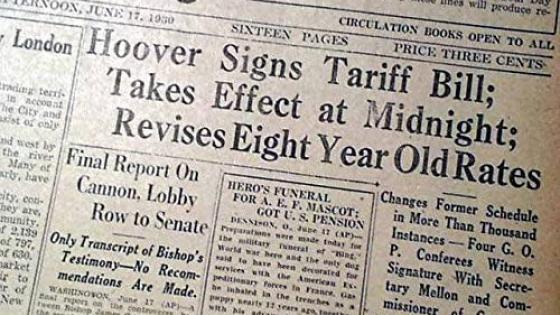This month marks 90 years since the US signed into law the Smoot-Hawley Tariff Act (SHTA). It was formally called “An Act to provide revenue, to regulate commerce with foreign countries, to encourage the industries of the United States, to protect American labor, and for other purposes”. Proposed by Senator Smoot and Representative Hawley just before the Wall Street crash in 1929, the Act was meant to create jobs and reduce unemployment by keeping imports out – a sentiment that had grown stronger by the time Herbert Hoover signed the act in 1930. Moreover, it was argued that the US government would benefit from additional tariff revenues.
Notwithstanding the intent of the architects, the actual effects were different. The toxic combination of failed monetary policy, a broken gold standard, and increasing protectionism contributed to pushing US unemployment from 8% in 1930 to 16% in 1931 and as high as 25% in 1932-1933. With the collapse of the Credit Anstalt in Austria in 1931, Europe too suffered from record unemployment, exchange-rate controls and rising protectionism. And failed cooperation on international economic policy only made the Great Depression worse (see Irwin 2019, 2020 and Ahamed 2009).
The example of Great Depression protectionism is instructive for the world today. We are yet again at a point in history when protectionism is on the rise – and when governments are considering (and already pursuing in some cases) ‘beggar-thy-neighbour’ policies in the belief that such measures will boost jobs and growth. “America First” seems to be the guiding ethos of US international economic policy. Europe is debating whether it needs ‘strategic autonomy’ in a post-Covid world, and China is accelerating its own ambition of creating ‘indigenous innovation’ by restricting markets to foreign firms. Many supporters of these concepts are not shy about the essence: shielding domestic economies from imports.
Decades-long waves of trade openings in emerging and developing markets have now come to an end. While there are differences in the scale and scope of new trade restrictions, policy makers seem to have forgotten the lessons offered by protectionism during the Great Depression. In our view, there is clear evidence of significant potential benefits from continued openness. At the same time, the structure of the global economic system, and the underlying national policy machinery that distributes the gains from the system, are under strains that can no longer be ignored. Otherwise the system may again collapse, just like it did 90 years ago.
But while there are uncomfortable similarities between the trade policy environments of 1930 and 2020, there are also important differences. Today, a greater part of value added (in particular jobs) depends on trade. Back then, many countries were locked into a gold standard that could not handle pressures of both deflation and huge balance-of-payment imbalances. Government expenditures did not have built-in automatic stabilizers to help an economy recover from an economic slump. Unlike today, the business cycle could not be revived by slashing taxes or boosting public spending: business taxes were not particularly high in the first place and there was no system in place for government transfers or creating public jobs. These differences between 1930 and 2020 translate into very real challenges to continued cooperation on international economic policy.
On top of cross-border financial linkages that transmitted contagion in both the Great Depression and Great Recession, we now have far stronger cross-border linkages on the real side of the economy. These follow from the emergence of global supply chains (aka global value chains or GVCs) managed by large global enterprises. The emergence of GVCs has proven a vehicle for increased efficiency and rapid transmission of technical change and has served to more closely link local employment to global production (see for example Cali et al. 2016). Yet, stronger cross-border linkages may both facilitate more rapid transmission of technology driven shocks affecting labour demand (Baldwin 2016, Baldwin 2019), and transmission of economic shocks of one region to employment in other regions (Acemoglu et al. 2016, Acemoglu et al. 2015, Acemoglu et al. 2012). This translates into a very real fear about future conditions of employment. Local dependence on global supply chains has also been important in determining the economic impact of Covid-19 shutdowns, which again serves to highlight how imposed restrictions have impacted GVCs negatively and subsequently exposed countries to cross-border economic policy contagion. Potentially, this has dramatic implications for employment, and it strains the viability of critical supply lines, for example in the case of medical supplies.
The emergence of a truly global economy has brought greater potential for growth and technology transfers, especially when linked to local economies. But it has also brought greater potential for disruption of local labour markets, for the viability of local communities, and even for the viability of national tax regimes. There is evidence of local labour market collapse following rapid economic growth on the other side of the planet (see for example Autor et al. 2013). Tax minimization by firms that rival national economies also means that the viability of public finances is challenged, even when we are not falling into a deep recession/depression (Egger et al. 2010, Egger et al. 2019).
Like in 1930, there are loud calls for more protectionism which, for the most part, draw on ideas and policy initiatives that were conceived long before the pandemic started. Even if these ideas are dressed-up in popular-sounding terminologies – ‘America first’, ‘strategic sovereignty’ or ‘value chain repatriation’ – they all boil down to the same intention: reducing imports and reducing dependency on others in the belief that such actions create more jobs and prosperity. The anniversary of the SHTA should remind us that protectionism can lead to unintended and unwanted outcomes, and that trade restrictions during an economic crisis would make the situation worse rather than better. There are very real challenges posed by the current crisis which need to be confronted directly. Else we may prove Mark Twain correct yet again: “History doesn't repeat itself, but it often rhymes.”1
References
Acemoglu, D, U Akcigit, and W Kerr (2016), “Networks and the Macroeconomy: An Empirical Exploration”, NBER Macroeconomics Annual, NBER Working Paper 21344.
Acemoglu, D, V Carvalho, A Ozdaglar, and Al Tahbaz-Salehi (2012), “The Network Origins of Aggregate Fluctuations”, Econometrica 80(5): 1977-2016.
Acemoglu, D, D Autor, D Dorn, G Hanson, and B Price (2015), “Import Competition and the Great U.S. Employment Sag of the 2000s”, Journal of Labor Economics 34(S1): S141-S198.
Ahamed, L (2009), Lords of Finance: The Bankers Who Broke The World, New York: The Penguin Press.
Autor, D, D Dorn, and G Hanson (2013), “The China Syndrome: Local Labor Market Effects of Import Competition in the United States”, American Economic Review 103(6): 2121-2168.
Baldwin, R E (2016), The Great Convergence: Information Technology and the New Globalization, Cambridge, MA: The Belknap Press of Harvard University Press.
Baldwin, R E (2019), The Globotics Upheaval: Globalization, Robotics, and the Future of Work, Oxford: Oxford University Press.
Cali, M, et al. (2016). "The Labor Content of Exports Database", Policy Research Working Paper No 7615, World Bank, Washington, DC.
Egger, P, W Eggert, and H Winner (2010), "Saving taxes through foreign plant ownership", Journal of International Economics 81(1): 99-108.
Egger, P H, S Nigai, and N M Strecker (2019), "The taxing deed of globalization", American Economic Review 109(2 ): 353-90.
Irwin, D A (2019), “Does Trade Reform Promote Economic Growth? A Review of Recent Evidence”, NBER working paper No w25927.
Irwin, D A (2020), Free trade under fire, Princeton: Princeton University Press.
Endnotes
1 Mark Twain may or may not have actually uttered this phrase, but we like to believe he actually did.





